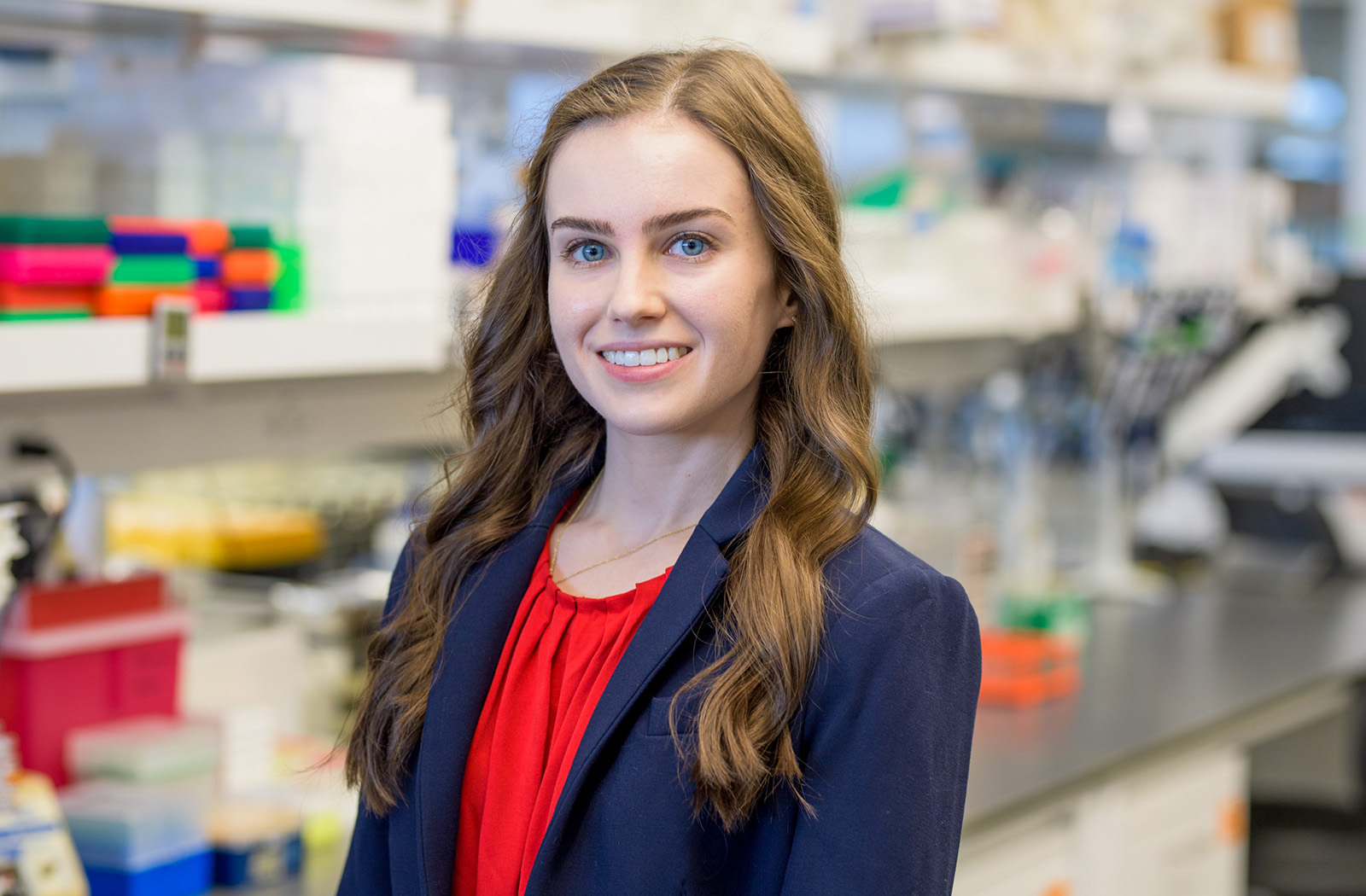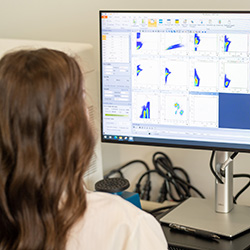
MD/PhD Student Receives F30 Fellowship Training Grant

Anngela C. Adams, an MD/PhD candidate at the University of Arizona College of Medicine – Phoenix, has been awarded a prestigious, individual F30 fellowship training grant from the National Cancer Institute (NCI).
This grant will support her continued training and research, which focuses on investigating the role of neoantigen-specific T cells in cutaneous squamous cell carcinoma (cSCC), using a model she developed in the lab of Karen T. Hastings, MD, PhD, a professor in the college’s Department of Basic Medical Sciences.
Adams’ research training has been previously supported by the NCI T32 institutional training grant, Interdisciplinary Training in Cancer Biology Research, and the 2022 American Skin Association Medical Student Grant Targeting Melanoma and Skin Cancer.
Non-melanoma skin cancer, which includes cSCC, is the most common cancer. Although it is known that T cells can control cSCC tumor growth, only a portion of patients with advanced cSCC respond to treatment with T cell targeting immunotherapies.

To study T cells in cSCC, Adams developed a new model. “Early in my PhD, I addressed the need for a clinically relevant cSCC model that can be used to study T cells that recognize mutated peptides in cancers called neoantigens,” Adams said.
To develop this clinically relevant cSCC model, Adams completed a 65-week study. During this study, she exposed models to solar UV light, using a device she built, and generated clonal cell lines from the tumors that grew.
This novel panel of transplantable cSCC cell lines has the benefit of sharing the same etiologic factor, a high UV-signature mutational burden and driver mutations with human disease.
In addition, the transplantable cell lines form tumors rapidly compared to the long-time frame for UV light tumor induction and allow for evaluation of neoantigen-specific T cells.
Under the primary mentorship of Dr. Hastings and co-mentorship from Clara Curiel, MD, at the University of Arizona College of Medicine – Tucson, Adams is using the cSCC model to study T cell responses that constrain cSCC tumor growth.
Her work has demonstrated a major role for CD8 T cells and a contributing role for CD4 T cells in controlling cSCC growth. She identified IFN-γ-secreting CD8 T cells within tumors that recognize a neoantigen in the cSCC cell line.
Vaccination with this neoantigen decreases cSCC growth, supporting that the immune response to this neoantigen controls tumor growth. Her work shows that neoantigen-specific T cells can constrain cSCC growth in a solar UV light-induced model.
This project is anticipated to identify neoantigen characteristics that elicit a T cell response and the features of neoantigen-specific T cell responses that promote tumor rejection. Adams was selected to give an oral presentation on this work at the International Societies for Investigative Dermatology meeting in Tokyo, Japan in May 2023. Her travel was supported by a grant from the North American Society for Investigative Dermatology.
“I am really passionate about my project, and I’m excited that other researchers may use the cell lines in the future to provide valuable insights into cSCC and other cancers,” Adams said. “I plan to continue to contribute to the field of cutaneous oncology research throughout my career.”
After Adams finishes her PhD in the Spring of 2024, she will complete the last two years of medical school and then apply for a dermatology residency. This grant will support her MD/PhD training to prepare for a career as a productive and independent physician-scientist in the field of skin cancer immunology.
Adams’ long-term career goals include providing insight into the immunological pathways involved in skin cancers, creating the foundation for the development of new treatments for skin cancers, and working to improve the lives of dermatology and cancer patients.
“Ms. Adams has a strong commitment to research and dermatology and has demonstrated a high degree of productivity during her training,” Dr. Hastings said. “I have no doubt that she will be successful in her goal of becoming an investigative dermatologist conducting research on skin cancer.”
“I greatly appreciate the supportive mentorship from Dr. Hastings and Dr. Curiel, as well as the opportunities provided by the University of Arizona College of Medicine – Phoenix,” Adams said.
The content is solely the responsibility of the authors and does not necessarily represent the official views of the NIH.
The NCI Ruth L. Kirschstein National Research service F30 Award supports promising doctoral candidates who will perform dissertation research and training for an MD/PhD degree in a scientific health-related field relevant to the mission of the NCI during the tenure of the award.
About the College
Founded in 2007, the University of Arizona College of Medicine – Phoenix inspires and trains exemplary physicians, scientists and leaders to advance its core missions in education, research, clinical care and service to communities across Arizona. The college’s strength lies in our collaborations and partnerships with clinical affiliates, community organizations and industry sponsors. With our primary affiliate, Banner Health, we are recognized as the premier academic medical center in Phoenix. As an anchor institution of the Phoenix Bioscience Core, the college is home to signature research programs in neurosciences, cardiopulmonary diseases, immunology, informatics and metabolism. These focus areas uniquely position us to drive biomedical research and bolster economic development in the region.
As an urban institution with strong roots in rural and tribal health, the college has graduated more than 1,000 physicians and matriculates 130 students each year. Greater than 60% of matriculating students are from Arizona and many continue training at our GME sponsored residency programs, ultimately pursuing local academic and community-based opportunities. While our traditional four-year program continues to thrive, we will launch our recently approved accelerated three-year medical student curriculum with exclusive focus on primary care. This program is designed to further enhance workforce retention needs across Arizona.
The college has embarked on our strategic plan for 2025 to 2030. Learn more.